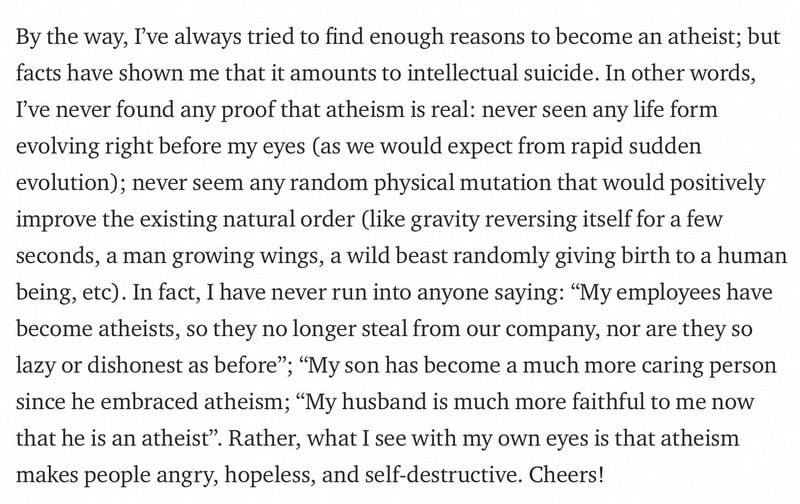
It is common for Evangelicals to lie to themselves when confronted with facts and evidence that does not fit their worldview. One need only look at their theological beliefs to see how lies are routinely used to prop up beliefs that can no longer be intellectually and rationally supported. It’s the twenty-first century, not the sixteenth, yet Evangelicals continue to use past justifications to support their outdated, irrational, anti-human beliefs. In other words, they lie to themselves.
So it is for Evangelicals when it comes atheists. Let me illustrate how Evangelicals see atheists with a screen capture from an Evangelical discussion forum. I can’t remember which forum I found this, but it was either the Fundamental Forums, the Baptist Board, or the Puritan Board — three peas in a pod:
 A
A
According to this Evangelical dullard, atheism makes people angry, hopeless, and self-destructive. Sound familiar? This statement, of course, has no grounding in reality. This is a lie the man tells himself; a necessary lie in order for his worldview to make sense. In his worldview, the world is neatly divided into two categories: saved/lost, in/out, black/white, Heaven/Hell. Atheists, then, are lost and headed for Hell. Their refusal to believe in the Evangelical God is a sign of a reprobate mind; people who have been turned over to Satan for the destruction of the flesh (Romans 1,2). Fair enough, I suppose. That’s what the Bible says, right? I can’t fault Evangelicals for believing the Bible; even though they conveniently not-believe-it when it suits them. What people such as myself find irritating is the attacks on our character. Oh, you are an A-T-H-E-I-S-T? Well, that means you live a life without meaning, purpose, and direction. You love to sin. No matter how often atheists correct this false notion, Evangelicals remain steadfast in their beliefs about atheists. No matter how much evidence is presented to the contrary, Evangelicals continue to lie to themselves about atheists. Why?
Evangelicals are convinced that they are, in God’s eyes, special; that Jesus has chosen to save them by his grace; that everything that happens in their lives is according to their God’s purpose and plan for them; that Heaven awaits them after they die — God’s reward for their faith and obedience. In order for these things to be true, atheists must be viewed as their enemies; people who hate God; people who follow Satan; people who have hopeless, empty lives; people who love to sin against the thrice holy God of the Bible. Of course, none of these things is true. The evidence at hand suggests that atheists on the whole live lives filled with purpose and meaning. Atheists don’t hate God or follow Satan, because they do not believe either exists.
For Evangelicals, atheists are evil personified. It’s been that way, in particular, ever since avowed atheist Madalyn Murray O’Hair successfully challenged the constitutionality of prayer and Bible reading in public schools. From the 1960s forward, atheists have become more vocal about their godlessness, and are far more willing to publicly and legally challenge the theocratic tendencies of Evangelicals. Groups such as American Atheists, Freedom From Religion Foundation, and the American Humanist Association have increasingly challenged Evangelical church and state violations in the courts — and have won. Things are so bad now for Evangelicals that even Satanists — who are atheists — are challenging the preferential treatment Evangelicals receive from the local, state, and federal government.
In reaction to what Evangelicals believe is a frontal assault on Christianity, they go out of their way to paint their atheistic enemies as bad, even evil, people. Atheists are called all sorts of names and tagged with all sorts of reprehensible behavior. Sure, there ARE atheists who are awful people, but talk about the pot calling the kettle black! Evangelicals have plenty of bad behavior going on in their own ranks, right? Evangelicalism is roiling with sexual abuse scandals and other sex crimes perpetrated by so-called men of God. (Please see the Black Collar Crimes Series.) Evangelicals have lost any sense of high moral ground, and are now considered the most hated religion in America. Many younger Americans believe Evangelicals are a hate group — people who despise LGBTQ people. Yet, despite all of this, Evangelicals continue to lie to themselves about atheists (and other non-Evangelicals). After all, if atheists have lives just as good and as meaningful as Evangelicals, why be a Christian? If atheists demonstrate the “fruit of the Spirit” without believing in said Spirit, what does that say about Christianity? If atheists love their spouses, love their children, hold down jobs, and contribute to their communities, what does that say about the claims Evangelicals make for their lives being “transformed” by the power of God? It seems to this atheist that Evangelical Christianity doesn’t offer anything that can’t be found outside of religion. Once the Bible with its Bronze Age foolishness loses its authority and power, people are free to craft meaningful, purposeful lives on their own terms. This scares the shit out of Evangelicals. And instead of accepting the fact that atheists are every bit as good, moral, and ethical as Evangelicals are, they lie to themselves as the man did in the above quotation.
There was a time when I would try to correct such false notions about atheists. I have, however, come to the place where I realize that until Evangelicals are willing to stop lying to themselves and are willing to see things as they are, there’s no hope of changing their minds. As long as their pastors preach thundering sermons and write scathing blog posts about the “evil” atheists, their lies will be reinforced. Who are they going to believe? Atheists, in their own words, or their pastors? Until Evangelicals come to the place where they rationally and skeptically weigh what their pastors say, they will continue to believe the lies that are told about atheists. There’s nothing we atheists can do about this except to continue living our lives in ways that give atheism a good name.
Bruce Gerencser, 68, lives in rural Northwest Ohio with his wife of 47 years. He and his wife have six grown children and sixteen grandchildren. Bruce pastored Evangelical churches for twenty-five years in Ohio, Texas, and Michigan. Bruce left the ministry in 2005, and in 2008 he left Christianity. Bruce is now a humanist and an atheist.
Your comments are welcome and appreciated. All first-time comments are moderated. Please read the commenting rules before commenting.
You can email Bruce via the Contact Form.

